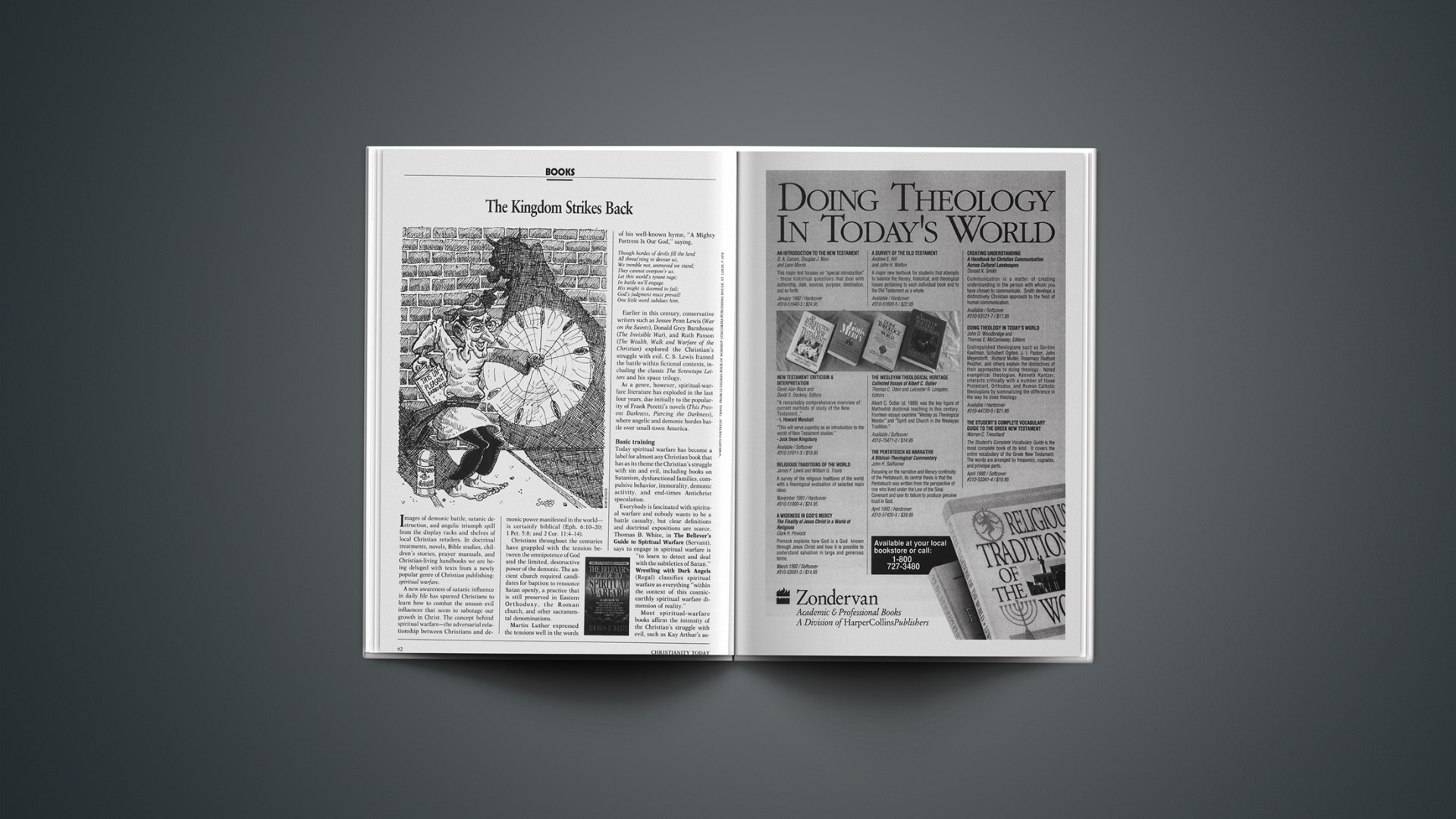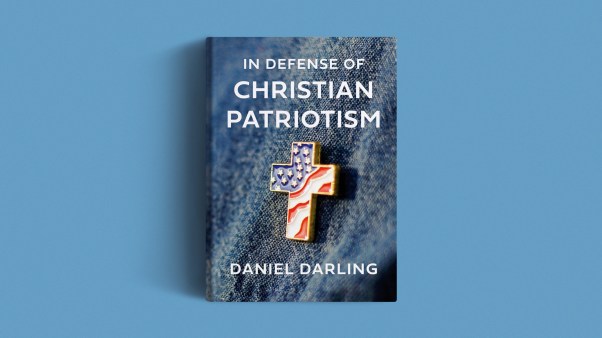Images of demonic battle, satanic destruction, and angelic triumph spill from the display racks and shelves of local Christian retailers. In doctrinal treatments, novels, Bible studies, children’s stories, prayer manuals, and Christian-living handbooks we are being deluged with texts from a newly popular genre of Christian publishing: spiritual warfare.
A new awareness of satanic influence in daily life has spurred Christians to learn how to combat the unseen evil influences that seem to sabotage our growth in Christ. The concept behind spiritual warfare—the adversarial relationship between Christians and demonic power manifested in the world—is certainly biblical (Eph. 6:10–20; 1 Pet. 5:8; and 2 Cor. 11:4–14).
Christians throughout the centuries have grappled with the tension between the omnipotence of God and the limited, destructive power of the demonic. The ancient church required candidates for baptism to renounce Satan openly, a practice that is still preserved in Eastern Orthodoxy, the Roman church, and other sacramental denominations.
Martin Luther expressed the tensions well in the words of his well-known hymn, “A Mighty Fortress Is Our God,” saying,
Though hordes of devils fill the land
All threat’ning to devour us,
We tremble not, unmoved we stand;
They cannot overpow’r us.
Let this world’s tyrant rage;
In battle we’ll engage.
His might is doomed to fail;
God’s judgment must prevail!
One little word subdues him.
Earlier in this century, conservative writers such as Jessee Penn Lewis (War on the Saints), Donald Grey Barnhouse (The Invisible War), and Ruth Paxson (The Wealth, Walk and Warfare of the Christian) explored the Christian’s struggle with evil. C. S. Lewis framed the battle within fictional contexts, including the classic The Screwtape Letters and his space trilogy.
As a genre, however, spiritual-warfare literature has exploded in the last four years, due initially to the popularity of Frank Peretti’s novels (This Present Darkness, Piercing the Darkness), where angelic and demonic hordes battle over small-town America.
Basic Training
Today spiritual warfare has become a label for almost any Christian book that has as its theme the Christian’s struggle with sin and evil, including books on Satanism, dysfunctional families, compulsive behavior, immorality, demonic activity, and end-times Antichrist speculation.
Everybody is fascinated with spiritual warfare and nobody wants to be a battle casualty, but clear definitions and doctrinal expositions are scarce. Thomas B. White, in The Believer’s Guide to Spiritual Warfare (Servant), says to engage in spiritual warfare is “to learn to detect and deal with the subtleties of Satan.” Wrestling with Dark Angels (Regal) classifies spiritual warfare as everything “within the context of this cosmic-earthly spiritual warfare dimension of reality.”
Most spiritual-warfare books affirm the intensity of the Christian’s struggle with evil, such as Kay Arthur’s assertion in Lord, Is It Warfare? (Multnomah), “I believe many Christians live in defeat, because they don’t understand that once they become children of God, they enter into war with the devil himself.”
The current crop of spiritual-warfare books often contributes positively to understanding Christian maturity in the midst of evil. Most of the books encourage readers to rely on the power of God, strongly exhort readers to abstain from sinful activities (which make one vulnerable to spiritual attack), and affirm the reality of the spiritual world.
Evelyn Christenson’s Battling the Prince of Darkness (Victor) opens with a strong focus on the triumph of Christ over Satan, “In the spiritual battle of the universe Satan always has been the loser, and Jesus always has been the winner. And those we win to Jesus are not only rescued from the doomed kingdom of the Prince of Darkness—but are citizens of the kingdom of Jesus. Eternal winners!”
Quin Sherrer and Ruthanne Garlock, in A Woman’s Guide to Spiritual Warfare (Servant), think that in order to fight the good fight Christians need “to become aware of our vulnerabilities, to renounce the sins we’ve yielded to in our areas of weakness, and then with the help of the Holy Spirit to strengthen our defenses against the evil one.”
Edward Gross, in Miracles, Demons, and Spiritual Warfare (Baker), points out the necessity of recognizing the reality of the spiritual world and spiritual power, both the demons’ and God’s: “Paul states that the nature of our battle is spiritual, not physical (Eph. 6:12). Therefore, its weapons also are not physical, but spiritual (2 Cor. 10:3–4). It is as foolish for a soldier to oppose a squadron of bombers with a sword as it is for the Christian to fight against spiritual enemies with dependence upon human wisdom or strength. Only the spiritual armor that God has provided is sufficient for victory in these battles (Eph. 6:10–18).”
Plastic Armaments
Along with the good principles gleaned from the current crop of spiritual-war-fare books are, unfortunately, some tares. First, because this is a relatively new trend, authors have little previous commentary to learn from, and consequently there is more speculation, supposition, and sometimes outright error than there would be in literature about a subject already comprehensively explored. As C. Peter Wagner, in Territorial Spirits (England: Sovereign World), notes, “The growing interest among scholars, pastors, missionaries, evangelists, and lay Christians in strategic-level spiritual warfare cries out for research and teaching.”
Second, readers caught up in the demonic drama of spiritual warfare are tempted to attribute to the demonic what is actually due to personal, moral irresponsibility. “The Devil made me do it” is a still-popular cliché because, although people recognize its fallacy, they believe it anyway. Writers tend to present teachings about “territorial spirits,” “demonization,” “generational sins,” and so on with the same dogmatism as well-developed historical and biblical theology. One example is Neil T. Anderson, who in The Bondage Breaker (Harvest House) expresses his belief that personal sin can devolve into direct demonic control, which he terms a “stronghold”: “If you exercise a sinful habit long enough, a stronghold will be established in your mind. Once a stronghold is established you have lost the ability to control your behavior in that area.”
A third vulnerability in this genre is the sensationalism usually associated with the demonic. Books focusing particularly on Satanism make some extravagant and unsubstantiated claims. Mark Bubeck, in The Satanic Revival (Here’s Life), reports subjective testimonies of satanic activity as though they were documented, officially validated facts. Jerry Johnston, in The Edge of Evil (Word), uses a nationally discredited story of supposed satanic involvement as documentation for some of his claims about satanic power and activity.
Finally, many contemporary books on spiritual warfare, including Johnston’s, Bubeck’s, White’s, and Anderson’s, promote the controversial view that Christians can be controlled against their wills by demons. Whether this is called demon possession, demonization, demonic oppression, or something else, such a view has never been the conservative view of the evangelical church. All of the contemporary books advocating the disputed view rely heavily (in some cases, almost entirely) on personal experience rather than comprehensive biblical exegesis. Thomas Ice and Robert Dean in A Holy Rebellion (Harvest House) as well as Edward Gross support the traditional position, arguing from Scripture that Christians cannot be controlled by demons.
In addition to general treatments on spiritual warfare, there are also specialty books. Wagner’s book deals specifically with “territorial spirits,” Arthur’s and Sherrer and Garlock’s are for women, and John Bibee’s Spirit Flyer series (InterVarsity Press, six volumes) contains excellent action stories for children (and is actually one of the best and most doctrinally conservative treatments of spiritual warfare).
Is the value of studying spiritual warfare equal to its popularity in today’s Christian market? A survey of the available books shows the question cannot be answered the way it is asked. Of course, whatever the Bible teaches, including “spiritual warfare,” is valuable for Christians to study (2 Tim. 3:16–17), and to neglect an area of biblical doctrine is to be spiritually malnourished. However, today’s popular, often sensationalistic and trendy, books on spiritual warfare seem to contain more empty calories than balanced nutrition.
If you are going to read in this area, we suggest you read the less sensational books, such as Michael Green’s Exposing the Prince of Darkness (Servant) or Richard Mayhue’s Unmasking Satan (Victor). Using your Bible as your guide, take the wheat and leave the tares. “Enemy-occupied territory—that is what this world is,” commented C. S. Lewis; “Christianity is the story of how the rightful king has landed … and is calling us all to take part in a great campaign of sabotage.” Let’s be prepared for the battle, but let’s do it with the tested and true weapons of biblical armament (Eph. 6:10–14) rather than the untried plastic prototypes of contemporary designer weapons.
Reviewed by Bob and Gretchen Passantino, directors of Answers In Action and award-winning journalists and authors of many books, including When the Devil Dares Your Kids (Servant).
Science And The Creationist Tradition
Creation and the History of Science, by Christopher B. Kaiser (Eerdmans, 309 pp.; $17.95, paper). Reviewed by Charles E. Hummel, author of The Galileo Connection (InterVarsity).
How are theology and science related to each other? During the last two millennia, debate on that question has centered largely on the interaction between creation and cosmology. A knowledge of this history is vital to understanding contemporary issues in the continuing dialogue.
Christopher Kaiser, professor of historical and systematic theology at Western Theological Seminary in Holland, Michigan, brings to this subject extensive research in both theology and the physical sciences. The book is the third in the History of Christian Theology series, edited by Paul Avis, which seeks to provide an extended introduction to Christian thought from a historical perspective. (The earlier volumes were The Science of Theology and The Study and Use of the Bible.)
The author presents a comprehensive study of the interaction between the theology of creation and the history of science from “the early church and Greco-Roman science” to “the creationist tradition and the emergence of post-Newtonian mechanics.” The book provides a wealth of information in a form that is both succinct and readable. His brief summaries of the thought of both famous and less well-known scholars are like an iceberg: the visible portion is supported by a much larger bulk of scholarship below the surface.
Kaiser emphasizes that the phrase “historic creationist tradition” is not to be confused with modern-day “creation science” or “creationism.” It does share a critique of the philosophy of naturalism, but evolutionary science can be viewed as a truncated version of the historic creationist tradition as much as creation-science can.
The fundamental idea in the creationist tradition is that the entire universe is subject to a single code of law which was established along with the universe at the beginning of time. The origin of the universe is beyond human understanding, depending as it does on the wisdom and will of God, but its subsequent operation can be understood due to the fact that human reason is in some way a reflection or image of that same lawfulness or reason that governs the world.
Kaiser shows how, contrary to the prevalent view, the roots of the so-called conflict between religion and science go back to the second century B.C. The issue was not one of opposition between theology and science as such, however, but between two opposing interpretations of creationist theology. The traditional outlook did not pose a gulf between God and the world, as currently claimed, but emphasized the relative autonomy of nature based on God’s creative word and power.
Far from being a hiatus in Western thought, the Middle Ages fostered vigorous debate regarding biblical creationism and interaction with the newly discovered writings of Aristotle. Medieval theology legitimized efforts to study ancient Greek natural philosophy texts and assimilate their contents within the Christian world view. Kaiser notes that it contributed three main elements to the modern concept and method of natural science: (1) the relative autonomy allowed to the sciences in relation to theology; (2) the value assigned to mathematical method and quantification; (3) the importance of observation and experiment.
The author also shows how the creationist tradition made significant contributions to the rise and development of classical (seventeenth to nineteenth century) physics. “Major breakthroughs in astronomy, medicine, mechanics, chemistry, thermodynamics, and electricity and magnetism were all associated with theological ideas related to God and creation.” Throughout 21 centuries, major contributors to the sciences were inspired by the belief in divine laws, which made the world comprehensible and gave it a degree of unity and relative autonomy.
Yet the creationist tradition began to unravel in the twelfth century with the polarization between theologies emphasizing the truths of reason and the workings of nature, on the one hand, and the supranatural mysteries of revelation, on the other. This was not a conflict between science and religion; both sides were rooted in the creationist tradition and both made significant contributions in science. Nevertheless, a process of fragmentation and secularization continued until the decline in the last century of the creationist outlook as an international, public tradition. Although the creationist tradition has largely lost its hold on twentieth-century culture, its remnants played a key role in the work of two principal founders of modern physics, Albert Einstein (1879–1955) and Niels Bohr (1885–1962). Both struggled with religious questions in their youth and rejected the formal teachings of synagogue and church. Yet both had a reverence for the unity and harmony of the world, and the ideal of selfless service.
Kaiser’s book is essential for those seeking to study the influence of biblical creation on the development of science over the last two millennia. But it will also prove informative for those who want an introduction to key issues and thinkers in this arena.










